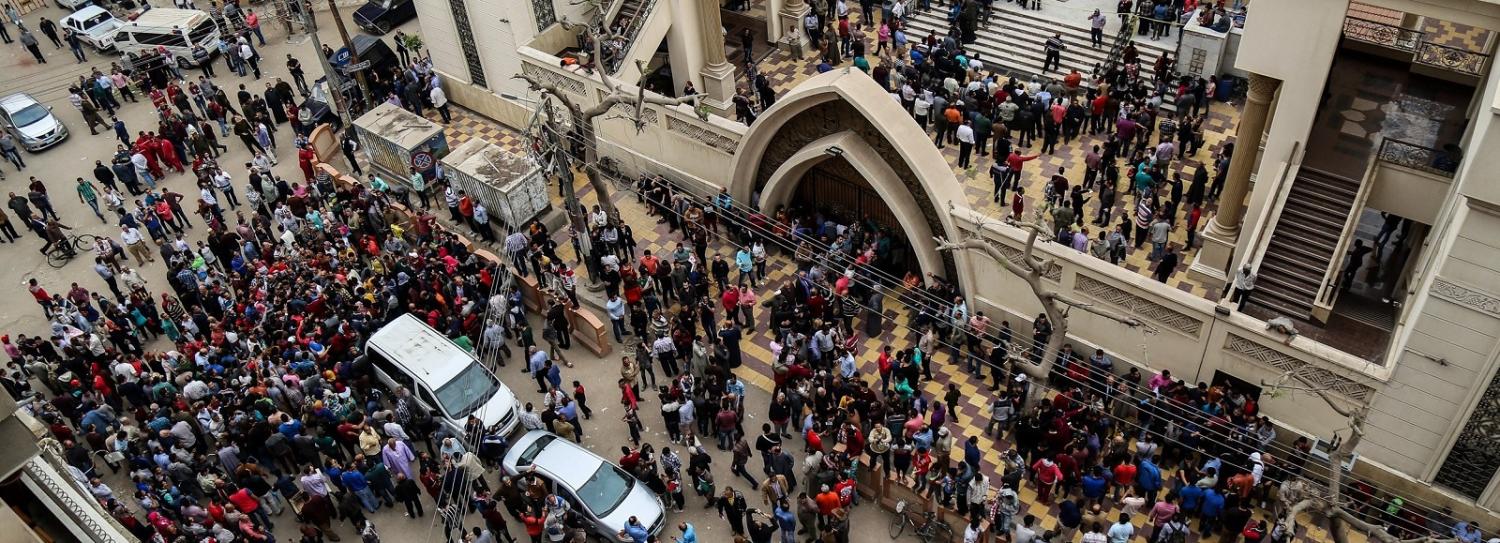What should have been a joyous Easter week has turned to tragedy in Egypt. Two suicide bombings targeting St Mark’s Cathedral in Alexandria (where the Coptic pope was praying just minutes before) and St George’s church in Tanta killed 44 people and injured hundreds during Palm Sunday services. Another bomb targeting a separate church in Alexandria was narrowly thwarted. This was the most sophisticated and deadly attack against Egyptian Coptic Christians in decades.
But it is not the first time that Egypt’s Copts have been the targets of violence by jihadists and it will not be the last. Unless the Egyptian state undergoes some serious transformation, and real political and societal reforms are enacted, Egypt’s Copts will continue to be a pawn in the struggle between the Egyptian state and Islamist forces.
Islamic State Sinai has repeatedly carried out attacks against Copts in Egypt since its founding. Prior to these latest attacks, IS Sinai attacked el Botroseya Church in Cairo in December 2016, killing 29 people. IS Sinai released a video claiming responsibility for that attack and vowed it would carry out more against the embattled minority group. In February 2017, scores of Coptic families were forced to flee their homes in Sinai after a series of targeted killings by IS. Even before Islamic State was a thing, Copts were the targets of violence by other jihadist groups, the state and their fellow Muslim citizens. The history of violence against Copts is long and deep.
The blame for the latest attacks, though, lays squarely on the shoulders of the Islamic State - a group devoid of any humanity or conscience. It gleefully took credit for the attack and again warned of more to come. 'Crusaders and their apostate allies should know the bill between us and them is very big and they will pay it with rivers of blood from their children, God willing. Wait for us, for we will wait for you.'
Islamic State and other jihadists of that ilk clearly have an ideological antipathy towards religious minorities but their main quarrel is with the violent and repressive governments of the Arab world. Yes, jihadism is a problem of ideological extremism but it is also a problem of state repression.
The Islamic State may have carried out the attack but the structural underpinnings that allowed for the emergence and growth of violent jihadists in Egypt are the result of decades of official and unofficial discriminatory policies against Copts. They are the result of the expansion of political repression, torture and mass arrests as a response to any security issue. The expansion of extremism and sectarianism is also a response to the state’s constriction of civil society and political participation.
Violence against Copts - or against the state or society at large for that matter - will continue unless these structural issues are addressed. Instead, the same tired refrain of ’national unity’ was again called by President Sisi and other government officials in the wake of this latest bombing. Just as it was after the previous church bombing merely five months prior.
These calls for national unity ring hollow. I, for one, will not be holding my breath waiting for the Sisi government to truly promote national unity through substantive political and societal reforms. Instead, President Sisi and his National Defense Council dusted off and heaved the old play book on the table and announced a three month state of emergency. Though what additional powers they would need to address the security climate is unclear when they already have unfettered power under a revised constitution and recently passed counterterrorism laws. Clearly, additional security powers are not the sole answer to defeating violent Islamists in Egypt when they have already been used to conduct mass arrests, oversea sweeping security operations and in the meantime stifle open political debate, to little effect. How long will ordinary Egyptians and other world leaders continue to overlook this when Sisi’s central promise - security and stability - remains unfulfilled?
President Sisi had the temerity to state in his nationally televised address in the immediate aftermath of the attacks, 'I won’t say those who fell are Christian or Muslim. I will say that they’re Egyptian'. His attempts to erase the sectarian nature of the violence is not only an exercise in magical thinking but an insult to every victim and their family - including the Muslim victims and the police officers who lost their lives.
But, like all authoritarian leaders, Sisi is concerned with more with the optics rather than the substance of the problem.
In his remarks after the attack, President Sisi also intimated that any media coverage undermining his authority would be restricted as has been done after similar national crisis. 'The media discourse has to be responsible,' he stated, 'It’s not acceptable to have the incident aired repeatedly on television stations all day'.
Like all authoritarian leaders, his hold on power trumps all else. But it will be Egypt’s minority Coptic population that will continue to pay the heaviest price for the Sisi government’s authoritarianism, repression and myopic security policies - regardless of whether footage is aired on state television or not.

